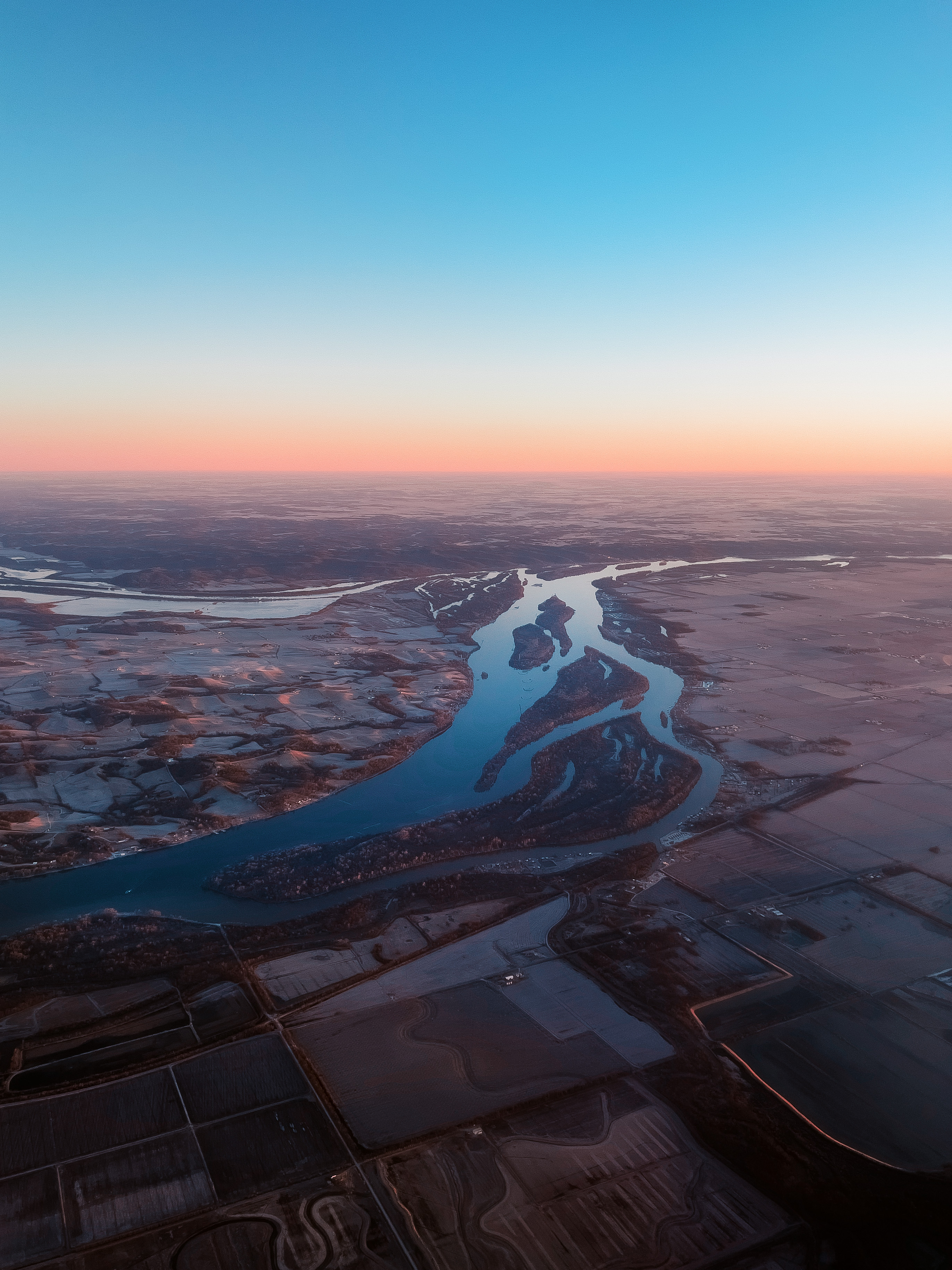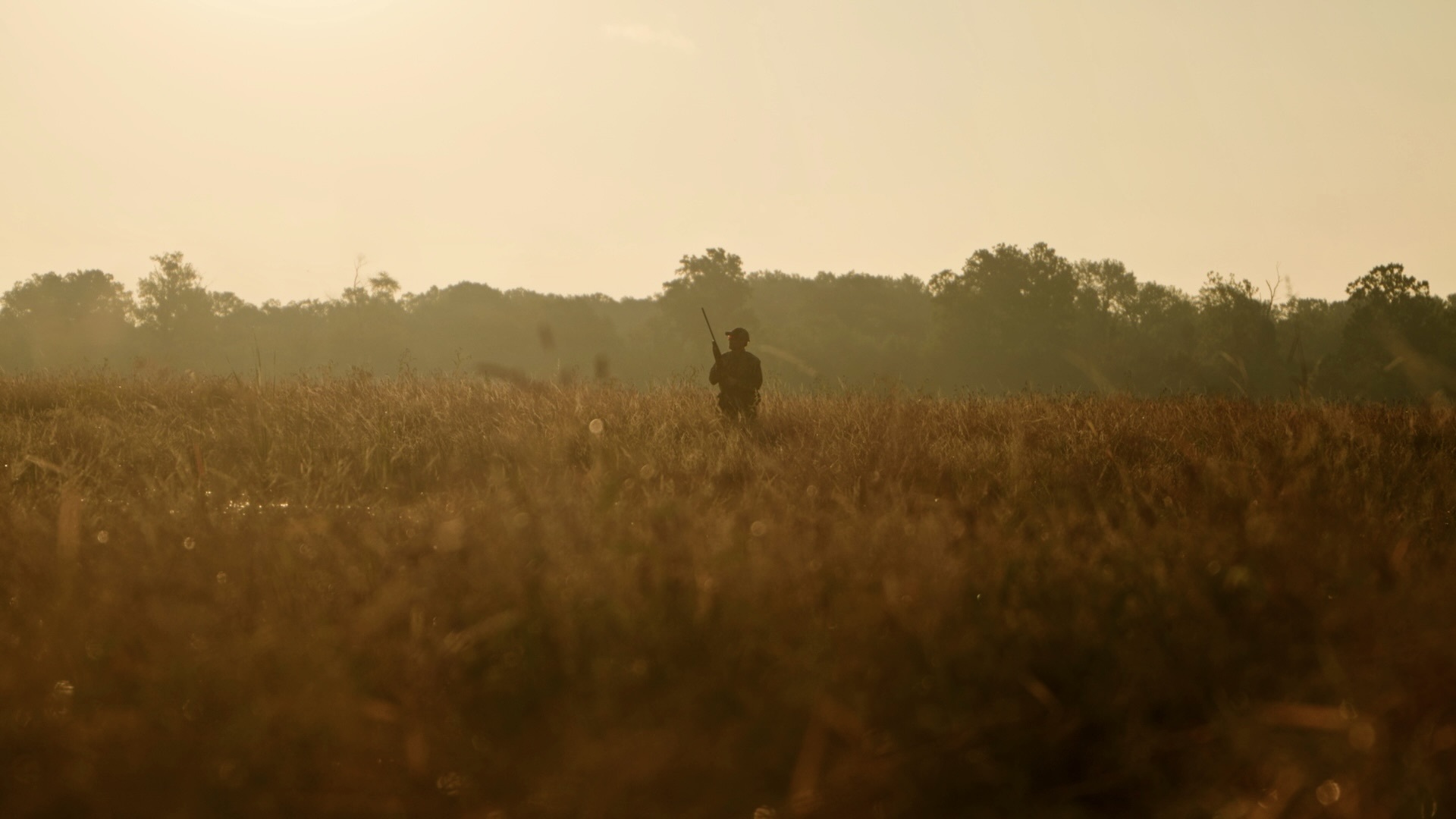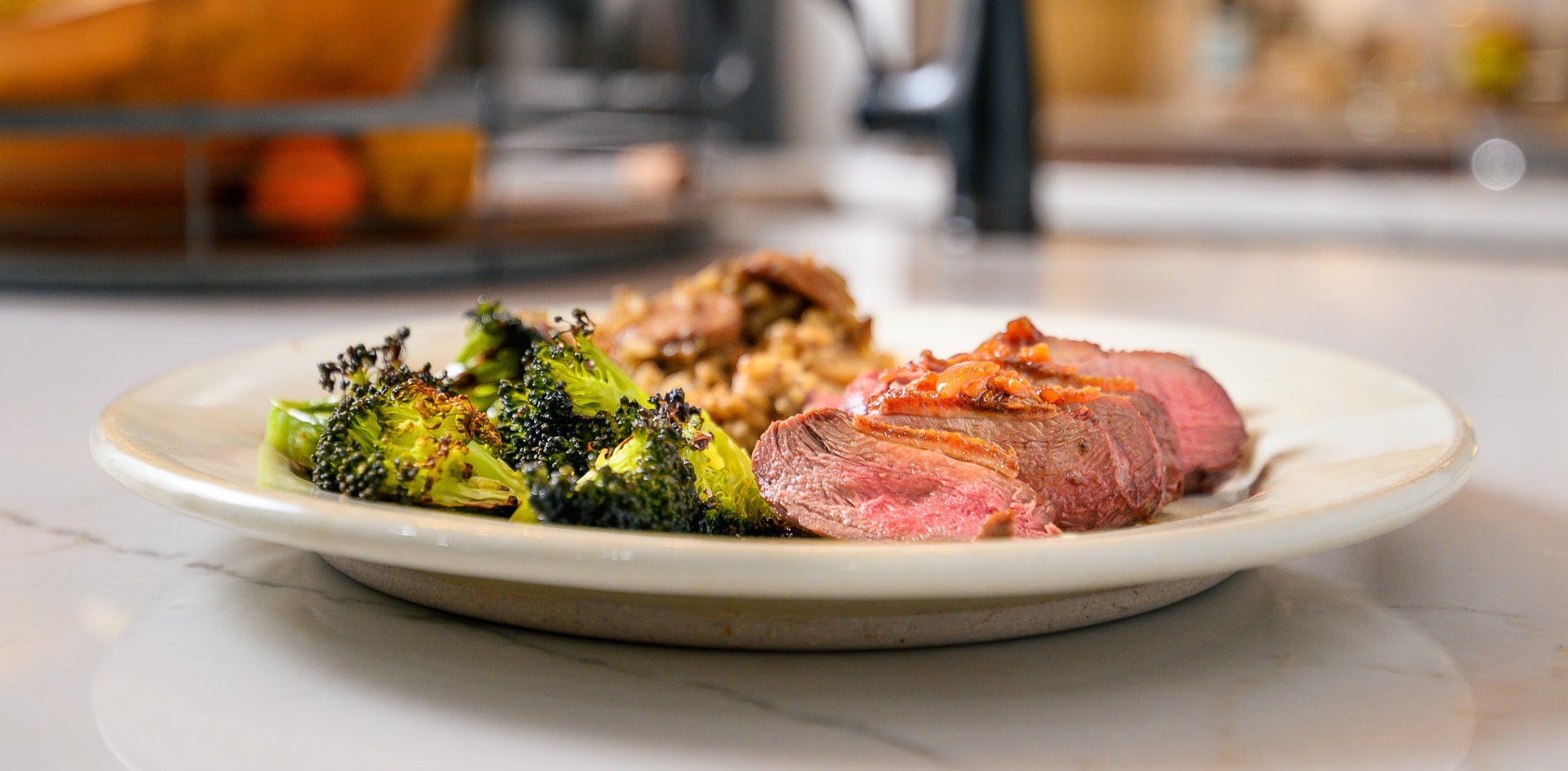Why We Hunt
No matter your opinion on hunting, whether you like it or not, we have all descended from hunters. No one can argue this fact. Every person on this planet is alive today because their ancestors got their hands dirty and fed the family.
This past January (2023), I was standing in my kitchen cleaning about 20 ducks preparing to host some friends for their first-ever wild game dinner.

Cleaning an animal gives you time to think. It's kind of like the "shower principle" - your hands and eyes are occupied, and your mind is focused enough to be on task but distracted enough to wander. While cleaning the ducks, I reminisced on the past few days and what it took to harvest them: a 2.5-hour drive down to the Missouri Bootheel, waking up at 4 am each morning, bundling up to beat the frigid temperatures, wading through waist-high icy water to reach our spot, sitting in a cold blind all day, the amount of money spent on all the gear it takes to have a successful duck hunt, the amount of time invested to get a property ready for duck season, etc... all in the hopes that we each harvest our limit of 6 ducks and maybe a few geese per day, and hopefully the next day, and the next day... Then a tired-eyed 2.5-hour drive back to St. Louis, followed by hours spent cleaning and cooking the ducks, all for this one meal with friends.
While cleaning these ducks, amid the feathers, blood, and guts, I thought about this and asked myself a question: Why do we do all this when I have a grocery store just blocks from my home?
Why do I hunt?
For me, there are 5 motivations to why I hunt: Food, Friendship, Conservation, Adventure, and Spiritual & Mental Health.
Food
Feed the Family. We say that a lot around here, it's one of the driving forces behind what we do. Food is hunting's greatest ambassador. I can spend hours trying to explain to a non-hunter why I hunt, or I can serve a perfectly cooked venison tenderloin with morel mushrooms. The plate speaks to the why much clearer than I can with words.


The meat that we harvest from hunting is incomparable to what you can purchase at a grocery store. You are getting free-range meat and every cut possible from the animal. For example, with a deer you are harvesting roasts, ribs, shoulders, shanks, flank steak, filets, chops, tenderloins, etc... A mature deer can provide you with 50+ pounds of meat! It would cost hundreds of dollars at a grocery store to get something comparable to what you can harvest from a deer.
For those who begin hunting as adults, meat is the number one draw. It is tangible, and acquiring it naturally makes sense to people. They look at the factory farm system we have and come to the realization that it is not normal. They want to know where their food comes from and that it lived a good life.
I have killed many animals in my life. I have seen their life force leave their body. It is a powerful thing to witness and not something that I take lightly. I believe that as hunters, we are responsible for taking care of and cooking the meat in the best way possible. We do not waste our harvest, we feed our families.
The plate speaks to the why much clearer than I can with words.
Friendship
Like most hunters, I got into hunting because my dad is a hunter. Hunting is a familial tradition for most, passed down from one generation to the next.
As a kid, I did not appreciate hunting the way I do now. I loved being outside and being on the farm, but I did not like sitting still in the cold for long periods of time. Even though I did not love it the way I do now, some of my favorite memories as a kid are on our farm and hunting with my dad. I am grateful for his patience and his passion.
Reflecting on hunting now as an adult, it has brought me even closer to my dad and it has introduced me to countless people that I now consider friends. Hunting creates a bond like few other things in our modern world can.

There has been a fear in the hunting world that we are a dying breed, that we are losing hunters. Fortunately, the numbers don't fully support this fear. According to the US Fish and Wildlife records for the year 2020, there were 15.2 million Hunting Licenses sold and 29.3 Million Fishing Licenses sold. Between 1960 and 2020, the actual number of hunters grew by 8.6 percent, but at the same time, the U.S. population increased by 83.4 percent, nearly ten times as fast. We have nearly as many hunters as ever, but per capita, we are a much smaller portion of the population.
Hunting has become a "small world." I'm always amazed how hunters seem to know the same people or know somebody through somebody. There is a kinship between hunters, an understanding. It seems easy to make friends with a fellow hunter. For many hunters, friendship is why they hunt. They love the togetherness and unity in a hunting camp. Many are content to not even be the one to make the kill, just being there and being a part of the environment is enough. They love sitting around the campfire and telling stories. They love helping clean any animals that were harvested that day. They love managing the land that is used for hunting. Our reasons for hunting can change over time, but our passion will never die.
There is a kinship between hunters, an understanding.
Conservation
Hunting is conservation.

For a lot of non-hunters, that sounds like an oxymoron. And technically it is, how can killing something help keep it alive? Well, the reality is this: "Conservation without money is just conversation." - Stirling Adams, Ducks Unlimited.
Conservation takes A LOT of money and is something that we as the American public (and the world) have to pony up for. But the general public doesn't, hunters do.
To understand the connection between conservation and hunting, you need to go back to the late 1800s, when American Wildlife was in a bad place. Market hunting, commercial fur-trapping, and America's rapid expansion westward pushed many species to the brink. Look no further than the American Bison. In less than 100 years, we took this majestic species from a population of 60± million in the late 18th century, to less than 100 animals in the wild by the end of the 1800s. Part of the American Mythos was that our land teemed with endless wildlife and resources for the taking, and we took too much.
The drastic state of wildlife got the attention of Theodore Roosevelt and George Bird Grinnell. Along with others, they established the American conservation movement around the idea that wildlife and other natural resources belong to the American Public and that we were its steward. This led to things like the establishment of our great National Parks System and the passage of The Federal Aid in Wildlife Restoration Act, or as it is more commonly known, the Pittman-Robertson Act. This bill requires that states use their revenues from the sale of hunting licenses for wildlife management. It also took an existing 11 percent excise tax on guns and ammunition and directed that money to state wildlife agencies for wildlife restoration and protection. A similar act was later passed to tax angling equipment. Money generated from license fees and excise taxes on guns, ammunition, and angling equipment provides about 60 percent of the funding for state wildlife agencies, which manage most of the wildlife in the United States. Since the bill’s passing, those contributions have invested over $25 billion into state conservation and recreation projects nationwide.

But there's a catch to this bill, to access those federal funds, states must pony up their own matching money - 25 percent or more of the total they're looking to get back. No match, no money. And with fewer hunters per capita, it's becoming difficult for some state agencies to match those funds. Many states have increased license fees for out-of-state hunters to compensate for the decrease in license sales, but you can only raise fees so much before you start pricing people out. At the same time, inflation is raising the cost of doing business, and things like climate change and urban development are threatening more species and habitats. A panel on sustaining America's fish and wildlife resources recently warned "Without a change in the way we finance fish and wildlife conservation, we can expect the list of federally threatened and endangered species to grow from nearly 1,600 species today to perhaps thousands more in the future."
And while according to the Pew Research Center, 74 percent of Americans believe the country should "do whatever it takes to protect the environment,” in most cases outside of hunting and fishing, there’s no conversation money being generated. The National Wildlife Federation says that current funding levels for national wildlife conservation are "less than 5 percent of what is necessary.”
We have to do better, and hunters can't carry this burden alone. Whether you like hunting or not, hunters are putting their money where their mouth is.
Whether you like hunting or not, hunters are putting their money where their mouth is.
Adventure
Most people today rarely step outside their comfort zones, or outside in general!

We are living progressively sterile, temperature-controlled, overfed, under-challenged, screen-centric, sheltered lives. Hunting offers us the opportunity to get outside and experience nature in a way that nothing else does. When we hunt, we immerse ourselves in it in a way that wildlife watchers, hikers, and other non-consumptive users do not. Hunters morph into a predator and match wits with our prey. We must understand them, anticipate their moves, read the terrain, and move through it in a way that does not give up our location. It is the ultimate challenge. We get up early and immerse ourselves in the elements. We have to be focused, patient, silent, diligent... It is uncomfortable. That is what makes it so satisfying. The harder the hunt, the sweeter the victory. The process itself is the reward, but a successful hunt makes it even more rewarding.
Hunting also offers us something that has been lost in our modern society, a Rite of Passage.
A Rite of Passage, also known as a "call to adventure" or the "hero's journey" has three key elements.
1. Separation - The person leaves the society in which they belong and heads into the unknown, in this case, the wild.
2. Transition - The person faces challenges that push them beyond their comfort zone, where they battle with nature and their mind telling them to quit.
3. The Return - The person completes the challenge and returns to their normal life as an improved person.

It’s an exploration of the edge of a person’s comfort zone. If they complete the challenge, successful or not, their comfort zone grows. It makes you a better person, which leads us to our final category...
The process itself is the reward, but a successful hunt makes it even more rewarding.
Spiritual and Mental Health
“Nerve-shaken, over-civilized people are beginning to find out that going to the mountains is going home; that wilderness is a necessity; and that mountain parks and reservations are useful not only as fountains of timber and irrigating rivers but as fountains of life.” - John Muir.
He wrote that in 1901... I would say our world has become even more nerve-shaken and over-civilized.

Whatever your spiritual beliefs, it is undeniable that something happens to the human body, brain, and soul when we are outside.
Nature and the Body:
In the early 1980s, Japan was becoming a more urban and tech-focused country, they also noticed an increase in depression and other health issues.
In response, the country’s forest agency created a nature-based wellness program, shinrin-yoku, which translates to “forest bathing.” The program promoted sitting or walking in the woods and “taking in” nature. They even created parks across the country to do so. Follow-up studies found that people who spent 15± minutes sitting in/walking through nature experienced significant improvements in critical health markers. Blood pressure readings, heart rates, and stress hormone levels all went down. In another study, people with the highest levels of stress saw a significant reduction in anxiety, depression, and hostility after only two hours in the woods.

Here in America, I see a lot of commercials and advertisements for drugs that promise to fix those conditions mentioned above. They come with a lot of side effects and a hefty price tag. A walk in the woods is free.
Nature and the Brain:

We were not created to be inside and stare at screens all day. This is something that I'm sure we all feel in our gut, but science is now backing this claim.
Rachel Hopman-Droste is a Ph.D. researcher focusing on how our brains are affected by technology and how nature can help us reclaim our focus. In 2016, she led a study that discovered only 20 minutes outside, three times a week, significantly dropped people’s cortisol levels, also known as the stress hormone. The catch to that study, of course, was that the participants couldn’t take their phones outside with them.
In nature, your brain enters a mode Hopman called “soft fascination.” Brain scans show that soft fascination is similar to meditation. Time outside restores the resources we need to think, create, process information, and execute tasks. It’s mindfulness without meditation.
But what happens when we go beyond that 20-minute dose? Hopman’s supervisor, Dr. David L. Strayer found in a study in 2012 that our brains "reset" after three days in nature without technology to distract us. They call it the "Three Day Effect." On day one, our brains are emitting beta waves, these are the "go-go-go" waves of our modern world. By day three, our brains are emitting alpha and theta waves. These are the same waves found in experienced meditators. These rare brain waves reset your thinking, reduce stress, and just make you feel better. The more time in nature, the better.
Nature and the Soul:
We all have different beliefs, so I won’t preach mine to you. However, I think there is one thing we can agree on... there is a reason why we escape to nature, why we are fascinated by the stars and inspired by the mountains, and why every major religion has a creation story.
We belong outside.
Conclusion
So back to the ducks that started this whole thing...

In our small St. Louis City home, my wife and I have about a dozen friends and family members packed in around our dining table. None of them have ever hunted before and I would say that most of them lean politically ‘left’.
I stand up and thank them for coming. I explain that we are about to eat pan-seared duck breast with a demi-glace made from the leftover duck fat.

I show them why we keep the skin on when skinning the duck. I tell them about the hunt and show them the photos we captured on that day. I warn them that, despite my best efforts, there might be some shotgun pellets in the breast and to be careful when chewing. I explain to them how a hunting license is the primary way that conservation dollars are raised and our involvement with groups like GRHA and Ducks Unlimited. I encourage them to ask questions and I tell them that I hope they like it.
We devoured those duck breasts.
This was nine months ago from the time of me writing this, they still talk about it.
When I show up to events and bring deer sausage, it doesn't last long.
I've now taken a few friends on their first deer hunt and it is a joy to witness someone have their first hunting experience and "get it".
We have to be evangelists for the lifestyle that we love.
This is Why I Hunt. What about you?
Let us know if you need help buying or selling your own Trophy Property!
Written, Photographed, and Filmed by Jake Brown
Additional Photography & Videography by Anthony Pozzi



